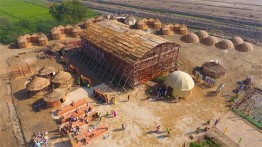Current Work | Yasmeen Lari: Barefoot Social Architecture Benefitting People and the Planet
Tuesday, December 7, 2021, 11:30am - 1:30pm

Heritage Foundation of Pakistan | Zero Carbon Cultural Centre, Makli, 2015–2019. Image courtesy of Heritage Foundation of Pakistan
This event will be conducted through Zoom. Zoom account registration is required, please register in advance here.
This fall and early winter, Current Work spotlights influential and innovative design practices that bring widely varying perspectives to contemporary housing challenges.
Yasmeen Lari is the cofounder and CEO of the Heritage Foundation of Pakistan, an organization working to conserve the nation’s historic art and architecture while providing large-scale humanitarian aid to local communities. Since the 2005 Kashmir earthquake, she has refocused her career on traditional materials, technologies, and architectures in a process she describes as “unlearning.” Positing a sustainable, grassroots model for the development of Pakistan’s built environment, she advocates for “barefoot social architecture,” a women-centered, carbon-neutral approach to housing that emphasizes co-creation and the use of sustainable materials like bamboo, lime, and mud. Under Lari’s leadership, the Heritage Foundation has helped build over 40,000 carbon-neutral structures across Pakistan.
Recent projects include:
- The Pakistan Chulah, a user-built zero-carbon stove that replaces dangerous open flames in homes across Pakistan.
- Bamboo Women’s Centre, a two-story bamboo structure in which women can socialize and study, built on stilts for flood protection.
- Zero Carbon Cultural Centre, a large bamboo structure built as part of Lari’s “zero-carbon campus,” a collection of community buildings adjacent to the historic Makli Necropolis near Thatta, Pakistan.
Yasmeen Lari graduated from the Oxford School of Architecture (now Oxford Brookes University) in 1964 and was elected to the Royal Institute of British Architects (RIBA) in 1969. She was elected president of the Institute of Architects Pakistan in 1978 and was the first chairperson of Pakistan Council of Architects and Town Planners (PCATP) in 1983. She retired from architectural practice in 2000 after designing several landmark projects in Pakistan, including the Taj Mahal Hotel in Karachi and the Pakistan State Oil House. For both her architectural and humanitarian work, Lari has been awarded Sitara-i-Imtiaz (The Star of Distinction), Hilal-i-Imtiaz (The Crescent of Distinction), the Fukuoka Prize for Asian Art and Culture, and the Jane Drew Prize. She is the author and co-author of several books and has lectured extensively at home and abroad.
The program will be moderated by urbanist, filmmaker, and writer Cassim Shepard. Shepard teaches in the urban design program at Columbia GSAPP and consults for mission-driven organizations on editorial and media strategy, public engagement, and urban planning projects. He was the founding editor of Urban Omnibus.
This program is supported, in part, by public funds from the New York City Department of Cultural Affairs in partnership with the City Council, and by the New York State Council on the Arts with the support of the Office of the Governor and the New York State Legislature.
The event is co-presented with The Architectural League of New York.
This lecture is free and accessible to the public through Zoom.
View the full Fall 2021 Lectures and Events List.




